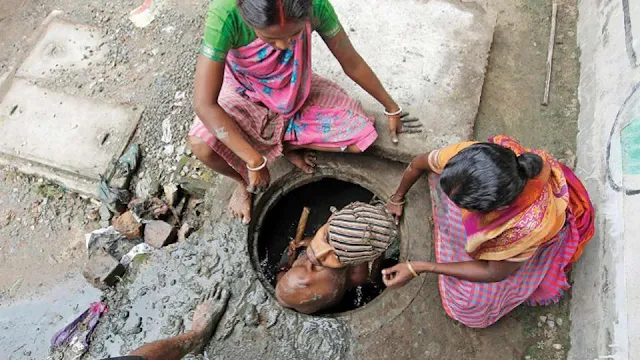By A Representative
The Dalit Adivasi Shakti Adhikar Manch (DASAM), a civil rights network, has demanded that “the due process” for the Prohibition of Employment as Manual Scavengers and their Rehabilitation (Amendment) Bill, 2020, scheduled for in current session of Parliament, should be followed before passing it.
Pointing out that public consultation and Parliamentary Standing Committee are the established rules of procedure, which have not been followed, DASAM, in a statement, said, it “condemns” the arbitrary approach of the government for coming up with the Bill, which seeks “complete mechanisation of sewer cleaning and a proposal of introduction of ways for on site protection and compensation of the manual scavengers in case of sewer death.”
The bill, said the statement, is through the Social Justice and Empowerment Ministry's National Action Plan, which asks the making of existing law, passed in 2013, tighter even as seeking the eradication of the manual scavenging practice by “managing” the unsewered areas with better plans through faecal sludge management system.
This bill acts makes the construction of insanitary latrines an offense and calls for the conversion of all insanitary latrines within a stipulated time frame. It bans employment of people as manual scavengers for cleaning of insanitary latrines and cleaning of sewers and septic tanks without protective gear.
The statement regrets that while in 1955, the Protection of Civil Rights Act was passed for the abolition of scavenging or sweeping on grounds of untouchability, only in 1989, the Prevention of Atrocities Act became an integrated guard for sanitation workers, recognising that more than 90 percent of people employed as manual scavengers belong to the scheduled castes.
It was only in 1993 that the Employment of Manual Scavengers and Construction of Dry Latrines (Prohibition) Act was passed seeking stricter stance against the employment of manual scavengers, but as this Act had its limitations. The 2003 CAG report observed, the Act "has failed to achieve its objectives even after 10 years of implementation.”
A decade later, Parliament passed the Prohibition of Employment as Manual Scavengers Act, 2013 with greater emphasis on rehabilitation of manual scavengers, yet the hiring of manual scavengers for the work of cleaning the septic tanks, directly or contractually, continued. Meanwhile, sewer-related deaths over the last one decade “increased four-fold”, reaching 1,000, the statement said.
Pointing out that public consultation and Parliamentary Standing Committee are the established rules of procedure, which have not been followed, DASAM, in a statement, said, it “condemns” the arbitrary approach of the government for coming up with the Bill, which seeks “complete mechanisation of sewer cleaning and a proposal of introduction of ways for on site protection and compensation of the manual scavengers in case of sewer death.”
The bill, said the statement, is through the Social Justice and Empowerment Ministry's National Action Plan, which asks the making of existing law, passed in 2013, tighter even as seeking the eradication of the manual scavenging practice by “managing” the unsewered areas with better plans through faecal sludge management system.
This bill acts makes the construction of insanitary latrines an offense and calls for the conversion of all insanitary latrines within a stipulated time frame. It bans employment of people as manual scavengers for cleaning of insanitary latrines and cleaning of sewers and septic tanks without protective gear.
The statement regrets that while in 1955, the Protection of Civil Rights Act was passed for the abolition of scavenging or sweeping on grounds of untouchability, only in 1989, the Prevention of Atrocities Act became an integrated guard for sanitation workers, recognising that more than 90 percent of people employed as manual scavengers belong to the scheduled castes.
It was only in 1993 that the Employment of Manual Scavengers and Construction of Dry Latrines (Prohibition) Act was passed seeking stricter stance against the employment of manual scavengers, but as this Act had its limitations. The 2003 CAG report observed, the Act "has failed to achieve its objectives even after 10 years of implementation.”
A decade later, Parliament passed the Prohibition of Employment as Manual Scavengers Act, 2013 with greater emphasis on rehabilitation of manual scavengers, yet the hiring of manual scavengers for the work of cleaning the septic tanks, directly or contractually, continued. Meanwhile, sewer-related deaths over the last one decade “increased four-fold”, reaching 1,000, the statement said.


Comments
https://www.livelaw.in/top-stories/every-institution-mechanism-or-tool-that-is-designed-to-hold-the-executive-accountable-is-being-systematically-destroyed-justice-ap-shah-163160